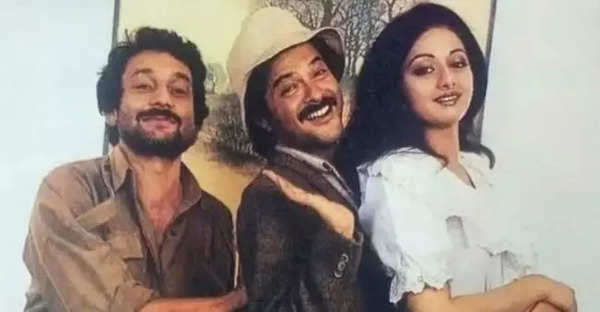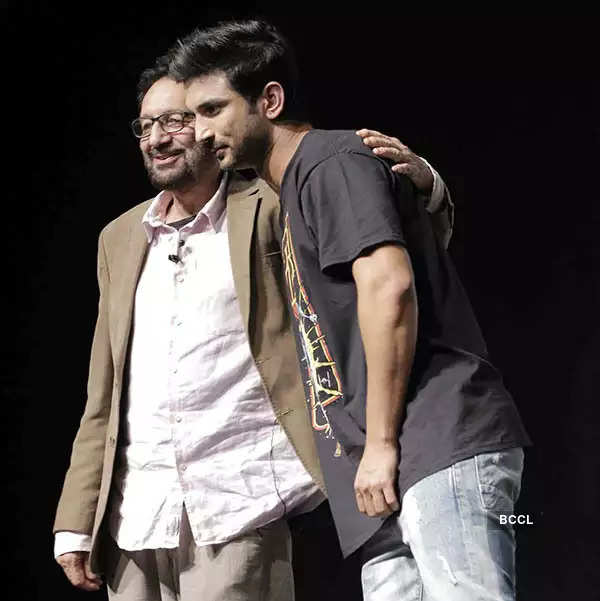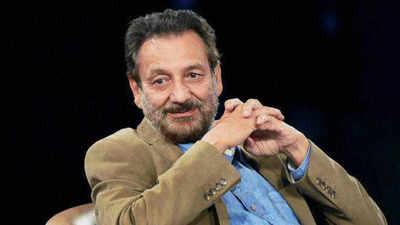
Veteran filmmaker Shekhar Kapur, who is known for his iconic works like Masoom and Bandit Queen, sat down with ETimes for an exclusive, candid conversation, offering a thought-provoking perspective on the future of cinema, both in India and internationally. Addressing a range of topics, including the Oscars, the need for a shift in the global cinematic narrative, and the impact of social issues on filmmaking, Kapur reflected on his illustrious career and upcoming projects. He also shared his experiences with Sushant Singh Rajput and Paani, while critiquing the commercialization of OTT platforms.
Today, our songs have won us an award. What is your take on that?
We feel a bit inferior to the West, still. This is an old colonial mindset. I’m telling everyone that every country has its film tradition. Our tradition is the largest in the world. 50 million people from this diaspora are our audience outside India.
Every year, there’s a talk about why can’t an Indian film win an Oscar.
That’s the problem with the Oscars. Why does the Oscar still have a category called Best Foreign Language Film? What does that mean? It means the best non-English film. 95% of the films in the world are not in the English language. They’re obviously saying, “This is an Oscar for us, not for you.”
It’s because of that one term that we fight for, Best Foreign Language Film. I don’t understand why they do that. I say, just leave it open. Laapata Ladies is a good film. So is, Boong (by Lakshmipriya Devi). Payal Kapadia’s All We Imagine As Light. So, we are producing good films. They’re not in the English language. So, that’s not our problem. That’s their problem. So, the category that we are fighting is the wrong category.
Was it difficult for you when you went to the West?
Any film is tough. It’s not like I’ve made Bandit Queen so I’ll get to direct films easily. You have to fight for your film in India or the West. They ask a lot of questions – whether you understand the three-act structure of storytelling etc. We’re the biggest storytellers. Why wouldn’t we understand that structure?
Initially, I didn’t want to direct Elizabeth. I conveyed the same to the producer who was the biggest in Europe at that time. He also said that he didn’t like the story. He asked me what kind of films I liked. I said, “I liked Danny Boyle’s Trainspotting. Can I take Elizabeth and make something like Trainspotting?” He said, “Make whatever you want to make. We trust you because we have come to you after watching Bandit Queen.” They saw that I did not conform to any particular form of film. They were okay with me changing the form of a historical drama with Elizabeth. And I did it.
What is the status of Masoom: The New Generation, Paani and Mr. India sequel?

The scripts of Paani and Masoom: The New Generation are ready. I have already said that I won’t be directing a sequel to Mr. India. I have never repeated any of my films. I would help you write a script but I won’t direct it. The comparisons with Mogambo and Calendar would start in my head.
What happens to such iconic characters if you can’t take them forward?
Boney Kapoor should have been more enterprising. I had suggested making a Hawa Hawai doll. They didn’t understand marketing. A Hawa Hawai doll, Mr. India bracelet, Mogambo comic book, or game could have been made.
Is Kaveri going to act in Masoom: The New Generation?
Kaveri tells me, “I don’t want to do this film because I want to be launched. Cast me only if you think I suit the character.” She writes good poetry. She is a singer-songwriter. She would not do it when I first asked her, but I said, “It’s because of observing you and your friends, that character has come out.” I’ve been writing the script for 10 years.
What is Masoom: The New Generation about?
My parents were refugees from Lahore. They lost everything and came to Delhi. My father was a doctor. He only used to think about his patients. I went to London to study. They built a house in Delhi. My parents are gone. My sister Sohaila lives there. I get many calls from Delhi saying, “Your house is worth 80 crores of rupees. You should sell it.” I’m not going to sell it.
That’s exactly why I am making this film. When does home become house? When does house become property? And when does property become real estate? They have made my home into real estate which I am never going to sell. When my mother was alive, I told her, “Mom, an earthquake won’t bring your home down, real estate prices will.”
Then I started to talk to people. Then I realized almost everybody has this problem. What are you asking to sell? So my question was, “Is the house an emotion or four walls?” That’s how it all started.
Today, anxiety has become a huge problem. How did I find that out? Because my daughter developed huge anxiety problems. She and her friends made me aware. I met a writer, a 19-year-old girl. I said, “Tell me about yourself.” She said, “I’m in therapy.” So, I wasn’t surprised. I said, “Do your parents know?” She said, “No, I can’t tell my parents. My grandmother knows.”
I asked her about her grandmother. She started crying. Then she said, “My grandmother gave up her life for me.” Then I started doing research and realized that society is all social structures. If a society has to progress and be stable, you need a relationship between the grandparents and the grandchildren. Because parents go to work.
We have stopped making films for the middle class. We have been making comedies and action films. Masoom is a story of a middle-class family which is still relevant. I see families falling apart over houses. We are a nation of migrants. There’s a loss of identity because you have gone away from home. So, the finding of identity with your grandparents. These are the issues I’m taking.
Indian actors want to be part of Hollywood. Do we have space there? Are we becoming a part of their narratives?
Every actor wants to do that which will expand their influence, their network, and audience. So, if they can do a Hollywood film, it expands their audience. I think they should stop looking at a Hollywood film as a badge of honour. No, it cannot be a badge of honour. It can of course. I did Elizabeth and the world knew about me. When I did Bandit Queen, the world kind of knew about me, but not really. Elizabeth and the films I did afterwards, and What’s Love Got To Do With? The whole world knows about me. So, that’s the advantage. Every Everybody wants to be on a platform that more people see and more people know. So, they should do it.
You’ve mentioned something in the narrative. That’s a very interesting thing. It’s time. That’s what I’m hoping this film festival do. Festivals like ours should change the narrative. The narrative is too Westernised. The West controls the narrative. We have to fight that. Our Mahabharat doesn’t end, no? Their stories end. Ours don’t. Why? Because destiny plays a big part in our stories. The story of Karma doesn’t end.
80% of the audience in the world is Eastern from this part of Suez. But for all this time, because of their marketing capabilities, the West has been able to dominate the narrative because their media is strong. Their marketing ability dominates it. I want this festival, IFFI, to create a new narrative in the world.
We should appreciate our filmmakers. I watched a film from Manipur, called Boong about a little boy. Such a good film. The whole Manipur culture and the tensions in Manipur. I understood all that. How they go to Myanmar, then they come out. It’s a fascinating film. Boong is a kid’s name.
What is the role of a film festival vis a vis arthouse cinema and commercial cinema?
When Masoom was released, people didn’t go to watch it immediately. The ones who purchased tickets for black market came behind me saying, “Return our money.” I said, “I didn’t take your money.” They said, “Sir, aapne bohot article picture banayi.” They meant to say art film. The same film is still relevant after 40 years. When was it an art film and when did it become a commercial film? So, there’s not much of a difference. It touched people’s heart, that’s all.
Bandit Queen was about to be taken out from the theatres but people from villages came to watch it saying it was their picture. People here started saying that there was a naked woman in the film. I told them to organize women-only shows. There were thousands of women inside the cinema hall and thousands standing outside. You got to touch the nerve of the people that they should feel that it’s their story.
That’s how Deewar became such a big hit. Salim-Javed caught hold of the socio-political times in the country and Amitabh Bachchan became the face of many people living in urban India who had left their homes to come to the big cities. So, the mother was the epitome of home. So, a film that catches on to the social-political movements of the people, and they can recognize it, that film will stay relevant.
Should Gala Premieres happen at the film festival?
Yes. And Film Bazaar hai to film festival hai. People from all walks of life who want to pitch their films come there. That’s why I say that it’s a great film festival. It’s because of the people who come here. They make the film festival. It is our responsibility to make visit worthwhile. That’s why these master classes, each master class is teaching you something.
Do you miss Sushant Singh Rajput when you think of reviving Paani?

People are getting it wrong. They thought that Sushant died because Paani never got made. It is not true. The truth is that Sushant and Yash Raj Films had a falling out long before he died. And therefore, I had to stop Paani because I didn’t know which other actor to take.
The Central Board of Film Certification has added two new categories 7+ and 13+. What is your take on that?
It’s a good thing. It will allow us to make more adult films. That’s what happens. But I don’t know how they can enforce it in an OTT platform. But the OTT platforms have their own censorship guidelines.
But I have a question. Would they dare cut a Spielberg film without at least talking to Spielberg or producers? Is this racism? Because I’m going to make a big issue about it. I understand that they have the legal something, something. But the least, they take a film like Banet Queen, which is one of the most famous films made in India, with one of the most famous directors in India. Now, try and do it with a big director in Hollywood. Would you have the courage to cut his film at least before calling him? We don’t even have legal rights or not. Why? Because they treat us like shit.
Some filmmakers might think that because they directed a film for a big platform they will get work outside. Tell me, one director in India, that because they’ve made a film for one of the OTT platforms, they have managed to get a film outside. That’s not what the OTT platforms are here for. They are here to exploit our market, not to make us international.

































